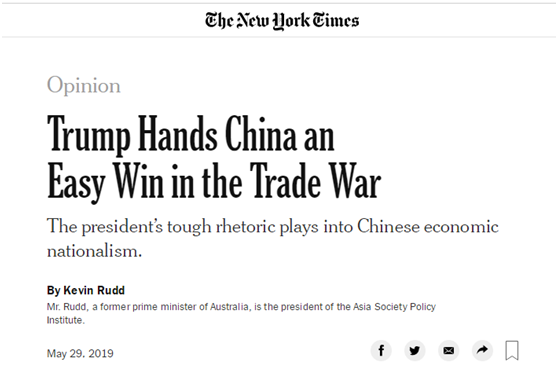A few days ago, former Australian Prime Minister Lu Kewen published a signature article entitled Trump to send a good trade war to China in the New York Times.
The article believes that Trump has given China a very effective nationalist card.Lu Kewen said that the China he observed in Beijing is running counter to the direction of the change of pressure.The article said that nationalism has always been an important factor in China and has been greatly strengthened through the refraction of historical prisms.Most of the past 100 years of dealing with the United States, China considers himself to be weak.Now in Beijing, China is no longer weak.

The following is the selection of the article:
When President Trump set off the table on May 5, Beijing's historical echo was loud and clear about this.In 1919 a century ago, the May Fourth Movement broke out in China, which was the direct response to Wooddro; President Wilson at the end of the war.Wilson promised to China as an American allies that after the war, the colonial sovereignty of Germany in Shandong will return it to China, but it is given to the Japanese.China immediately broke out of anti -American nationalist mood mdash; MDash; one of its main results was the establishment of the Communist Party of China MDASH; MDASH; the Communist Party of China has ruled China in the past 70 years.
Therefore, when China faces the pressure of the slowdown in domestic economic growth, Trump has given Chinese leaders a very effective nationalist card.The Chinese media is now full of descriptions of China's economic toughness, the demands of nationalism, and even calling MDash; MDash; Chinese official description of China at that time to make concessions.... The chairman recently visited the starting point of MDash; MDASH; the Long March said that the Communist Party of China had experienced hard and dangerous but eventually achieved victory.
I can almost hear the complaints of members of the Trump administration: Why should we consider the old things of China in China? The answer depends on what Trump wants the most.If it sounds tough among American voters, he knows this.However, if it is to bring substantial changes to the situation of the negotiation of the China -US bilateral trade agreement, to promote the change of China's trade policy, solve the problem of compulsory technology transfer, theft of intellectual property, industry subsidies, currency manipulation, and other series of non -tariff barriers, then I amIt is not sure how much effect is.
We know that after the Trump issued a few years, China stated three red lines, that is, the unacceptable position of the United States in the trade negotiations: First, after the signing of the proposed trade agreement, the tariff will remain unchanged for a period of time.Second, if China is determined that China violates the agreement, the United States can impose punitive tariffs, but China shall not impose tariffs for countermeasures.Essence
The China I have observed in Beijing in the past few weeks is running counter to the direction of changes in the transformation of pressure.At the same time, economic analysts have been estimating that the impact of the overall outbreak of the trade war mdash; MDASH; probably the loss of 1.2%of China's domestic GDP growth.According to the Chinese media, this is completely in the controlled range; China has the ability to support domestic demand through fiscal and currency stimulus policies to maintain a level of more than 6%.
If the Cold War is what the Trump administration wants, its strategy has achieved great success.If not, and Trump really wants to reach a trade agreement to reasonably reduce bilateral trade deficits and substantially changes China's economic behavior. The US negotiation strategy needs to be adjusted significantly.
China's open position has always been negotiations that can continue.Even in the new red line frame, there may still be room for an agreement.If the United States has made concessions on tariff reservations and subsequent tariffs that increase tariffs, China may agree to buy more American products.However, in fact, the difficulty of reaching an agreement today has greatly increased.
In the final analysis, nationalism is not only a factor in the United States.In China, it has always been an important factor and has been greatly strengthened through the refraction of Chinese historical prisms.Most of the past 100 years of dealing with the United States, China considers himself to be weak.Now in Beijing, China is no longer weak.


